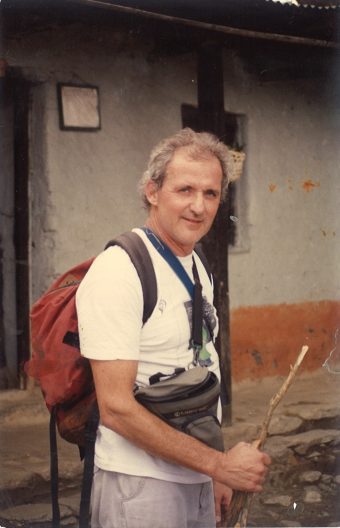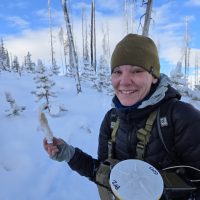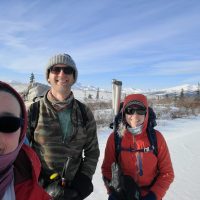The Impact of Giving – A SEFS Donor Spotlight Series: John C. Garcia
This is the second donor spotlight in a series. This series of stories reveals the impact that donors have on students, faculty and research here at the School of Environmental and Forest Sciences and more broadly at the College of the Environment.
When the late John C. Garcia’s wife Carole sought out to honor her husband’s legacy, she reflected on John’s life, his biggest lasting accomplishments and his dedication to mentoring and supporting others. Carole knew she wanted to create a fund that would support the research community at the University of Washington. John passed away in November of 2020 but his work as an undergraduate and grad student at the UW in the 1970s would set him out on a path to professional mentorship here on the west coast and as far abroad as Nepal.
John’s Time at the UW and Early Career
We had the pleasure of speaking with Carole about John and she said, “John felt that one of his biggest lasting accomplishments was his environmental assessment and in-country training work on hydro projects in Nepal and Southeast Asia.” John’s education and the relationships he forged at the University of Washington led him there. John graduated with his BS from the UW in 1973 and a MS from the College of Forest Resources in 1974, now the School of Environmental and Forest Sciences. As the first in his family to graduate from high school, John joined the Air Force so he could qualify for the GI Bill – it afforded him the opportunity to go to college.
Carole said, “John particularly reveled in the ability to design his own major for his undergraduate studies so that he could combine his love of ecology and wildlife sciences with the then-emerging technique of using remote sensing and GIS for incorporating wildlife considerations in regional planning. This ability to be able to ‘think outside of the box’ and have his program at UW support his academic interests, served him well throughout his professional career.” John started a natural resources consulting firm early in his career and went on to form Garcia and Associates, colloquially known as “GANDA”.

The Fund Comes to Life
Carole emphasized that John always appreciated the educational foundation he received at UW and recognized the importance of higher learning and the opportunities it afforded to him. He continued to mentor and support others with similar dreams and aspirations, including his staff, family members, and the professionals he worked with in Nepal. Having run a successful business for decades, he recognized the importance of attracting – and retaining – key talent; therefore, it seemed only fitting to focus this gift on attracting and retaining stellar talent at UW, as well.
That is how the John C. Garcia Term Professorship came to be. Here at SEFS, the John C. Garcia fund has attracted and retained the talent of many extraordinary minds that allow SEFS and The College of the Environment to remain a college unlike any other in the world. Dean Maya Tolstoy said, “our students, faculty, staff and postdoctoral scholars are some of the foremost on the planet, enabling us to serve as a global hub for innovative research and excellence in teaching.”
The fund currently supports four SEFS faculty members and their labs: Laura Prugh, Francisca Santana, Sameer Shah and Claire Willing. Professor Laura Prugh runs the Prugh Lab – focused on wildlife community ecology. Laura said, “I am deeply grateful to hold the John C. Garcia Term Professorship that has been critical to the success of our highly impactful wildlife conservation research program. As wildlife communities face unprecedented challenges, I am honored to lead such a talented group of researchers in seeking new knowledge to help wildlife populations thrive into the future.”
The Prugh Lab’s Impact
The Garcia family’s fund has supported the Prugh Lab to advance wildlife science and conservation through field studies, analyses and publications, Prugh emphasized. From researching the effects of predators and people on elk, investigating how snow conditions are changing and affecting predator-prey interactions to researching the effects of outdoor recreation on wildlife, the team is busy shaping our understanding of wildlife community ecology. Much of the team’s work has been picked up by large media outlets and the Prugh Lab is often on the receiving end of interview requests to help readers better understand our relationship with wildlife.
The Prugh Lab in the News
- Prugh Lab member and SEFS PhD student Sam Kreling’s research cited in Washington Post article, “Why we celebrate black squirrels, but think of gray ones as pests”
- Prugh’s research on daylight saving time and wildlife-vehicle collisions featured on NPR, “The end of daylight savings time means an uptick in vehicles crashing into deer”
- Taylor Ganz, a postdoctoral researcher in the Prugh Lab had her research featured in the Spokesman Review, “Food availability more important than predators for white-tailed deer in the northeast Washington”
- Undergraduate student Lindsey Bartholomew’s capstone research provides new insights to help people coexist with wildlife in urban areas as explained in Discover magazine article, “How to coexist with coyotes in your neighborhood”
-

- MSc student Christine Phelan holding a snowshoe hare foot that we found at a lynx kill. In her other hand is a Trimble GPS unit that the team uses to map the tracking route with sub-meter accuracy.
-

- From L to R: SEFS faculty Laura Prugh, PhD student Ben Sullender and Postdoc Taylor Ganz in Denali studying predator-prey interactions. Ganz is carrying a federal sampler (metal pole) the team uses to measure snow-water equivalent.
Assistant Professor Francisca Santana’s Impact
Francisca Santana joined SEFS faculty in the fall of 2023 as a part of a climate adaptation-themed cohort that includes Claire Willing and Sameer Shah. Santana’s research focuses on how individuals and communities respond and adapt to climate-related hazards. The Garcia family’s fund has supported her research on the social processes of protective health decisions in response to wildfire smoke in the Western U.S. and the development of nature-based solutions to address changing coastal conditions in Louisiana. Retaining and maintaining talent at the graduate level is made possible and more impactful through support like the John C. Garcia Term Professorship. In 2024, Santana brought on three graduate students to build up her research group. Santana said, “I look forward to continuing to pursue innovative research questions related to climate adaptation and advising students as they investigate and explore their own research interests.” Santana has also made an offer to one graduate student to join the SEFS community in Fall 2025.
Assistant Professor Claire Willing’s Impact
Establishing a research program at SEFS and building an environment for her student’s growth and success have been top of mind for Willing since she joined SEFS in the fall of 2023. The John C. Garcia funds have allowed her to do just that. Since joining SEFS, she has managed lab renovations, established and outfitted her molecular lab space, hired and trained three graduate students, a lab manager, a lab technician, and undergraduate students and she has made offers to another 2 graduate students to join in Fall 2025. Willing is actively involved in the mentorship of SEFS students across differing career stages, currently serving as a committee chair for three graduate students and as a committee member for nine students. Willing has put students front-and-center in her commitment to pushing research forward and building a solid foundation at SEFS.
“This award’s funding allowed me to pursue additional grant funding that will go directly to supporting my graduate students. I was also able to provide mentorship for my students to write their own fellowship proposals, allowing them to pursue some of their own creative research ideas, something that I know John appreciated about his time here at UW,” Willing shared.
Willing was interviewed for the College of the Environment’s podcast called FieldSound. Give the interview a listen and learn more about Willing’s research on the vital plant-fungal interactions hidden below the soil surface, particularly mycorrhizal fungi.

Assistant Professor Sameer Shah’s Impact
Shah described the fund as incredibly impactful. One aspect of the fund that has been so instrumental in supporting Shah’s work is its flexibility. The John C. Garcia term professorship is discretionary in nature so Shah can use the funds for many purposes, from purchasing field equipment, hiring needed expertise for data analysis, and retaining editorial service support.
For example, Shah is conducting a study that assesses basic access to drinking water in India and how that’s changed over the last couple of decades. In this study, the John C. Garcia term professorship supported hiring statistical support to analyze very large datasets to understand trends and patterns. Shah has also used the funds to support the travel costs associated with attending conferences where he presents his research. This month, Shah and Santana will be traveling to Detroit to present at the 2025 American Association of Geographers. They will co-host a session focused on learning more about the climate-related risks posed by “compounding” hazards, such as hurricanes and heatwaves, and explore with session presenters ways to better understand these impacts. As he focuses his work on climate “maladaptation” the support is instrumental in data collection, lab equipment and editorial support.
Contributions from our supporters are crucial to the success of the School of Environmental and Forest Sciences. Whether you support the general needs of the School or directly support students and/or faculty, your giving makes a difference in our community and world and helps Environmental and Forest Sciences sustain and nurture the environment, economy, education, health and culture.
To make a gift to the general fund, please visit:
Friends of the School of Environmental and Forest Sciences Fund (DSC-121881)
To explore other giving opportunities, please visit SEFS Giving website or contact Laura Perez Hamilton, Senior Director of Advancement with the College of the Environment.

